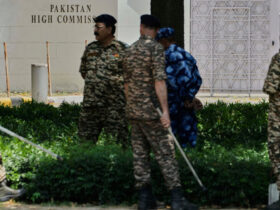The personal cellphones of dozens of current and former Barnard College employees pinged Monday evening with a text message that looked, at first, like a scam.
The text said it was from the Equal Employment Opportunity Commission, part of a review of the employment practices of Barnard. A link led to a survey that asked respondents if they were Jewish or Israeli, and if they had been subjected to harassment.
After faculty members asked Barnard administrators about the text, the college confirmed to them on Wednesday that the messages were authentic — part of a federal investigation into discrimination against Jewish employees that started last summer.
Serena Longley, Barnard’s general counsel, acknowledged in an email to the faculty members that Barnard had provided the commission with the personal contact information of staff members to give them the opportunity to participate. “Participation in the survey is voluntary,” she wrote.
The texts, which faculty members said appeared to have gone to nearly all Barnard staff members, appear to be part of an aggressive new tactic by the Trump administration to collect reports of alleged antisemitism at Barnard, a women’s college affiliated with Columbia University that has come under heavy criticism for pro-Palestinian demonstrations on its campus.
The Trump administration has been taking on elite universities over what it says is a systemic problem with antisemitism, but critics of the administration say the confrontation actually represents a broader attack on academic and institutional freedom. The administration has withheld more than $400 million in federal research funding from Columbia until it does more to fight antisemitism, and immigration authorities arrested several pro-Palestinian demonstrators in an attempt to deport them.
The questions in the survey for employees were pointed.
“While working at Barnard College, were you subjected to any of the following because you practice Judaism, have Jewish ancestry, are Israeli, and/or are associated with an individual(s) who is Jewish and/or Israeli?” read question No. 9.
Faculty and staff members were asked to check all that apply from a list of 10 options that included “unwelcome comments, jokes or discussions” and “antisemitic or anti-Israeli protests, gatherings or demonstrations that made you feel threatened, harassed or were otherwise disruptive to your working environment.”
Debbie Becher, a Barnard sociology professor who is Jewish, said that the survey disturbed her in several ways. As a Jew, she said she found it “a bit terrifying” that the federal government “wants to know who the Jews are through some text message and Microsoft Office form.”
The last two days, she said, had been filled with group chats among professors, teaching assistants and others who received the texts and who first wondered if they were real. They then expressed dismay that Barnard did not tell them that the university was sharing their personal cellphone numbers with the government.
“Clearly, it made everyone scared,” Dr. Becher said. “I’ve been getting text messages from my former graduate students and other faculty members — I still am — asking what they should do.”
Nara Milanich, a Barnard history professor, said it reminded her of her research into 1930s Italy, when lists of Jews were put together by the local government. “We’ve seen this movie before, and it ends with yellow stars,” she said.
It also troubled her that the government appeared to be “fishing” for reports of antisemitism.
“Evidently, they don’t have sufficient people to file lawsuits, so they have to go shake the trees to find people?” she said.
The text messages were first reported by The Intercept.
Robin Levine, a Barnard spokeswoman, said the school had no official comment and referred comments to the E.E.O.C. She did not dispute the authenticity of the texts or the email from Ms. Longley. The commission, a federal civil rights agency responsible for enforcing laws that make it illegal to discriminate against employees because of the person’s race, color, religion, sex, national origin, age, disability or genetic information, did not immediately return a request for comment.
In her email note to faculty, Ms. Longley said that Barnard had been “robustly defending the college” against the commission’s inquiry, but that the E.E.O.C. was legally entitled to obtain the contact information of Barnard employees so that it could offer them the opportunity to participate in the agency’s investigation.
Going forward, she wrote, the school would provide advance notice when it was required to hand over personal information as part of an investigation or litigation, unless a court order prohibited the university from doing so.











Leave a Reply